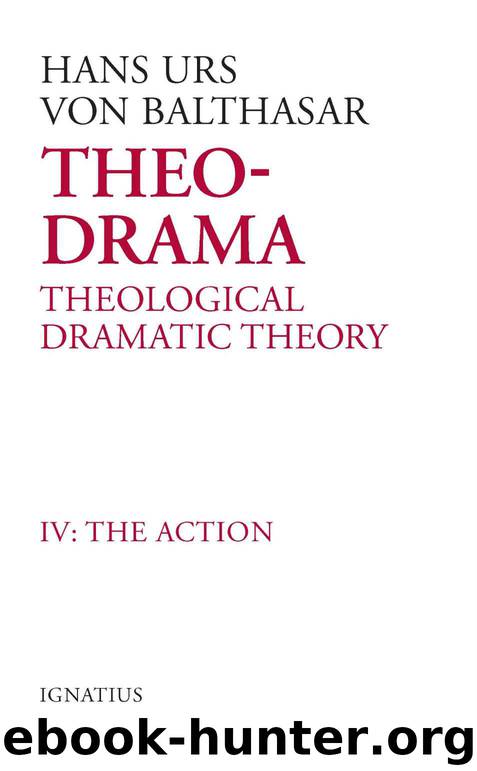Theo-Drama, Vol. 4: The Action by Hans Urs von Balthasar

Author:Hans Urs von Balthasar
Language: eng
Format: mobi
Tags: Spiritual & Religion
ISBN: 9780898704716
Publisher: Ignatius Press
Published: 1994-11-14T16:00:00+00:00
Final Approaches
In his doctrine of redemption,1 Sergei Bulgakov tries to grasp the kenosis of the Cross as the last of God’s self-utterances. It begins within the Trinity, with God the Father’s self-dispossession in favor of the Son, and proceeds via the kenosis involved in creation.2 Christ will bear the world’s sin: this is the rationale underlying all creation.3 It remains a mystery how Christ bears sin, but it takes place because, ontologically, the New Adam4 bears within him the totality of human nature—in this, Bulgakov is following the Greek Fathers—and because Christ’s humanity, as a result of the Hypostatic Union with the whole of humanity (through kenosis), is empowered “in a supra-empirical manner”5 to appropriate all the sins of the world: “acceptation comme les Siens propres”,6 “il les admet à l’intérieur de lui-même”7 “le péché semble lui devenir propre”,8 “Le Christ n’est nullement ‘un autre’pour tout homme, car le Nouvel Adam comprend chaque individu humain. . . naturellement dans son essence, et compassionnellement dans Son amour. Et le péché. . . n’est déjà plus pour Lui le péché d’autrui, mais le Sien propre.”9
However, this is because of his obedience to the Father. Thus, “in a kind of oboedientia passiva”,10 a “sacrificial obedience”,11 he allows himself to be placed under God’s anger against sin.12 Thus he “drinks the chalice” and is “forsaken by God”.13 Through this experience of sin he “destroys” the “reality” of sin that men have created.14 His suffering is hypostatic and, as such, its intensity is supra-temporal (surtemporal. . . étendu au passé et à l’avenir)’15 and, in that sense, “eternal” (l’éternel est qualité, et non quantité) ,16 Although this suffering is the endurance of something utterly alien,17 something that is simply “accepted” and hence “quelque chose d’incomparable et même de contraire aux souffrances des pécheurs” (the damned), in its own way it is “l’equivalent de ce qui eût été propre à l’humanité, c.à.d. les tourments de l’enfer”.18 By this concept of “intensive equivalence”, Bulgakov expresses the identity and difference between Christ’s suffering and that due to sinners. He strongly emphasizes that the Cross is an event involving the whole Trinity;19 we shall have to devote some attention to this in our concluding remarks.
A. Feuillet, in his L’Agonie de Gethsémani, enquêtes exégétiques et théologiques,20 calls for “un dialogue profond entre exégètes et théologiens”, particularly with regard to the Passion of Jesus.21 Exegesis, he asserts, can only be objective if it is conducted on the basis of faith,22 not in an ivory tower.23 As far as the meaning of the Passion is concerned, Lagrange’s interpretations are “souvent pauvres du point de vue doctrinal”.24 Prat tries in vain to reduce everything to “solidarity”;25 and it is not enough to say, with A. Plummer, “que Jésus a tellement sympathisé avec ceux qui souffrent que leurs souffrances devenaient comme les siennes propres”.26
Feuillet undertakes a minute analysis of the Mount of Olives narratives (especially that of Mark) in order to show the theological depths they contain. The Fathers were too timid to draw
Download
This site does not store any files on its server. We only index and link to content provided by other sites. Please contact the content providers to delete copyright contents if any and email us, we'll remove relevant links or contents immediately.
The Lost Art of Listening by Michael P. Nichols(7506)
Why I Am Not A Calvinist by Dr. Peter S. Ruckman(4153)
The Rosicrucians by Christopher McIntosh(3521)
Wicca: a guide for the solitary practitioner by Scott Cunningham(3179)
Signature in the Cell: DNA and the Evidence for Intelligent Design by Stephen C. Meyer(3138)
Real Sex by Lauren F. Winner(3023)
The Holy Spirit by Billy Graham(2953)
To Light a Sacred Flame by Silver RavenWolf(2823)
The End of Faith by Sam Harris(2742)
The Gnostic Gospels by Pagels Elaine(2531)
Waking Up by Sam Harris(2461)
Nine Parts of Desire by Geraldine Brooks(2369)
Jesus by Paul Johnson(2362)
Devil, The by Almond Philip C(2332)
The God delusion by Richard Dawkins(2309)
Heavens on Earth by Michael Shermer(2284)
Kundalini by Gopi Krishna(2185)
Chosen by God by R. C. Sproul(2164)
The Nature of Consciousness by Rupert Spira(2108)
